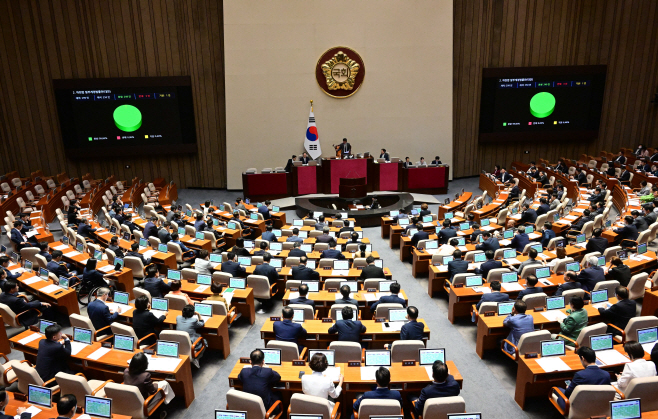임시국회는 대한민국의 국회에서 정기국회 외에 필요에 따라 열리는 회기를 말합니다. 국회의 주요 활동은 정기국회와 임시국회로 나뉘며, 임시국회는 특정한 필요에 의해 소집됩니다.

임시국회의 주요 특징
1. 소집 조건
- 대통령이 필요하다고 판단할 때.
- 국회의원 4분의 1 이상의 요구로 소집 가능.
- 정기국회와 달리 연중 아무 때나 소집할 수 있습니다.
2. 회기
- 한 번 소집되면 회기는 30일 이내로 제한됩니다.
- 임시국회는 여러 번 열릴 수 있으나, 회기 연속성은 정기국회에 비해 상대적으로 짧습니다.
3. 임시국회의 역할
- 긴급한 법률안 처리
- 정부의 긴급 현안 논의
- 예산이나 추가경정예산안 처리
- 국정감사나 국정조사
임시국회의 필요성
1. 긴급한 사안 대처
국가적 비상상황, 경제적 위기, 외교적 문제 등 즉각적인 대응이 필요할 때 임시국회가 소집됩니다.
2. 정기국회 한계 보완
정기국회는 일정이 정해져 있어 긴급한 법안이나 안건을 처리하기 어려울 수 있습니다. 임시국회는 이런 한계를 보완합니다.
3. 정치적 협의의 장
정치적 쟁점에 대해 여야 간 협의가 필요할 때 활용됩니다.
임시국회와 정기국회의 차이점
구분정기국회임시국회
| 소집 시기 | 매년 9월 1일 | 필요에 따라 수시로 소집 |
| 소집 주체 | 자동 소집 | 대통령 또는 국회의원 4분의 1 이상 요구 |
| 회기 | 100일 | 30일 이내 |
| 주요 의제 | 예산안 심의, 국정감사 등 정례적 의제 | 긴급 법안, 추가 예산 등 긴급 의제 |
임시국회의 한계
- 정치적 대립
- 임시국회는 여야 간 정치적 갈등이 격화될 경우 효율적으로 운영되지 못하는 경우가 있습니다.
- 남용 가능성
- 잦은 임시국회 소집이 정치적 도구로 이용되면 본래의 긴급 대처 기능이 약화될 수 있습니다.
참고: 헌법 및 국회법 관련 규정
- 대한민국 헌법 제47조
- 국회는 정기회 외에 대통령 또는 국회의원 4분의 1 이상의 요구가 있을 때 임시회를 소집할 수 있습니다.
- 국회법 제5조
- 임시회의 소집 요구는 목적, 기간, 의제를 명시해야 합니다.
What is a Special Session of the National Assembly?
A special session (임시국회) of the National Assembly in South Korea refers to sessions convened as needed outside the regular sessions. The main activities of the National Assembly are divided into regular sessions and special sessions, with special sessions being convened for specific needs.
Key Features of a Special Session
1. Conditions for Convening
- When deemed necessary by the President.
- Can be convened upon the request of at least one-quarter of the members of the National Assembly.
- Unlike regular sessions, special sessions can be convened at any time throughout the year.
2. Session Duration
- Once convened, the duration of a special session is limited to within 30 days.
- Multiple special sessions can be held, but their continuity is relatively short compared to regular sessions.
3. Roles of a Special Session
- Handling urgent legislation.
- Discussing urgent government issues.
- Processing budgets or supplementary budgets.
- Conducting state audits or investigations.
Necessity of Special Sessions
1. Addressing Urgent Issues
Special sessions are convened to respond immediately to national emergencies, economic crises, diplomatic issues, etc.
2. Complementing Regular Sessions' Limitations
Since regular sessions have fixed schedules, they may find it challenging to handle urgent bills or issues. Special sessions complement these limitations.
3. Forum for Political Consultation
Special sessions are used when political consultation between ruling and opposition parties is necessary on contentious issues.
Differences Between Special and Regular Sessions
| Convening Time | September 1 annually | Convened as needed |
| Convening Authority | Automatically convened | President or request by at least one-quarter of National Assembly members |
| Session Duration | 100 days | Within 30 days |
| Key Agenda | Regular agendas like budget review, state audit | Urgent issues like emergency laws, supplementary budgets |
Limitations of Special Sessions
- Political Conflict:
- Special sessions may not operate efficiently if political conflicts between ruling and opposition parties intensify.
- Potential for Abuse:
- Frequent convening of special sessions as political tools can weaken their original purpose of urgent response.
References: Constitutional and National Assembly Act Regulations
- Constitution of South Korea, Article 47:
- The National Assembly can convene a special session upon the request of the President or at least one-quarter of its members outside the regular session.
- National Assembly Act, Article 5:
- The request for convening a special session must specify the purpose, duration, and agenda.
什么是特别国会?
特别国会(임시국회)指的是韩国国会在常规会议之外,根据需要召开的会议。国会的主要活动分为常规国会和特别国会,特别国会为特定需要而召集。
特别国会的主要特点
1. 召集条件
- 总统认为有必要时。
- 可根据至少四分之一的国会议员的要求召集。
- 与常规会议不同,特别会议可以全年任何时候召集。
2. 会议时长
- 一旦召集,特别会议的时长限制在30天以内。
- 可以召开多次特别会议,但其连续性相对较短。
3. 特别国会的作用
- 处理紧急立法。
- 讨论紧急政府问题。
- 处理预算或追加预算案。
- 进行国家审计或调查。
特别国会的必要性
1. 处理紧急问题
特别国会被召集以立即响应国家紧急情况、经济危机、外交问题等。